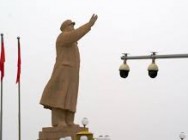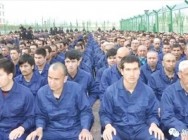Last Minute

- Conflict and Alliance: The US and China: A Centennial Dance: A Century of Relationship from 1900 to 2024
- CHINA RELATIONSEAST TURKESTAN PROBLEM AND TURKEY
- FRONTLINE China Undercover
- Elimination of “Uyghur Counter-Revolutionary Officials” in Academic Fields—Exact Quotes Translated from a Mandarin Audio File
- In Push for Trade Deal, Trump Administration Shelves Sanctions Over China’s Crackdown on Uighurs
- Dalai Lama’s 60th Anniversary Symposium: İlshat Hassan speech in English and Chinese
- Uyghur Detainees from Xinjiang ‘Placed in Nearly Every Prison’ in Shandong Province
- Shahrezad Ghayrat, Unrepresented Women
- Uighur Americans Speak Against China’s Internment Camps. Their Relatives Disappear.
- Rozinisa: The true story of the Uyghur girls in the prison

-

Conflict and Alliance: The US and China: A Centennial Dance: A Century of Relationship from 1900 to 2024
-

CHINA RELATIONSEAST TURKESTAN PROBLEM AND TURKEY
-

FRONTLINE China Undercover
-

Elimination of “Uyghur Counter-Revolutionary Officials” in Academic Fields—Exact Quotes Translated from a Mandarin Audio File
-

In Push for Trade Deal, Trump Administration Shelves Sanctions Over China’s Crackdown on Uighurs
-

Dalai Lama’s 60th Anniversary Symposium: İlshat Hassan speech in English and Chinese
Uyghur Farmers Detained After Posting Land Complaints Online
Three Uyghur farmers campaigning for compensation for land confiscated in their village in China’s northwestern Xinjiang region were detained and taken away to another city this week after posting a statement outlining their grievances online, farmers said.
The three men are farmers’ representatives from Qaziriq village in Kashgar city’s Nezerbagh township, where residents say their livelihood has been dampened by the seizure of thousands of acres of farmland for an airport and a special development zone since the 1980s.
Township police detained the three—Turghun Mamut, Memettursun Abduwayit, and Abduqeyyum Memet —on Monday, and were believed to have escorted them to Hotan city some 300 miles (500 kilometers) southeast of Kashgar, villagers said.
In a phone call on Wednesday, Mamut told RFA’s Uyghur Service the three were being “taken to Hotan for ‘sight-seeing,’” adding that he was under surveillance and not free to say more about their situation.
“I cannot speak with you any longer because we are being watched and controlled by others right now,” he said before hanging up.
The detention came shortly after the three had posted a statement signed with their names and documenting villagers’ complaints on the popular Uyghur-language Baghdax website.
Official visit
Some residents believed the men had been taken away to prevent them from meeting with high-level officials who were expected to visit the village this week to probe land complaints.
A fellow farmer in the village who gave only her first name Amangul said Tuesday that villagers believed the men had been taken “because some high-level inspectors would be arriving in the village” the next day.
“So the local authorities were intentionally removing them from the sight of the inspectors,” she said.
She said three men’s families had argued with village officials to demand the detainees be allowed to return.
“We heard that the three farmers’ representatives were forced to travel to Hotan, escorted by Nezerbagh township police. They were forced to stay under house arrest at a hotel in Hotan,” she said.
Shortage of farmland
In their online statement, the three farmers said that after thousands of acres of farmland were confiscated in their village, Qaziriq now has 2,400 mu (400 acres) for a population of 4,400.
Amangul said the land was not enough for residents to be able to sustain themselves through agriculture and that villagers were facing a grave land shortage problem.
“We are farmers; we have no property except for our land,” she said.
“Because of the land shortage, we don’t have enough agricultural products to feed our families.”
Farmers from Qaziriq began appealing to local authorities about their land complaints since December 2012, traveling to the national capital Beijing and Xinjiang capital Urumqi to lodge their grievances after Kashgar authorities.
“We have appealed to Kashgar authorities about the … land in Qaziriq village since the end of 2012, but still the case has not been resolved,” Mamut said on Wednesday.
“The Autonomous Region government in Urumqi replied to our case and sent a letter to the Kashgar authorities, but the local government has ignored it,” he said.
Complaints ignored
After some of the land was taken over for Kashgar Airport in the 1980s, in 2002, the Kashgar municipal government confiscated 5,000 mu (820 acres) of land close to the facility, ignoring residents’ complaints, according to the farmers.
Two years later, the township government sold 864 mu (142 acres) to the Kashgar-Shenzhen Development Zone, which was soon used for residential buildings, they said.
After farmers objected, township officials gave 1,500 yuan (about U.S. $240) to each village residents in order to stop them from complaining, they said.
Land grabbing is a major problem in Xinjiang—the homeland of the mostly Muslim, Turkic-speaking Uyghur group—as well as in the rest of China.
Land acquisition for development, often resulting in lucrative property deals for local officials, sparks thousands of protests by local communities across China every month, many of which escalate into clashes with police.
All land in the country is ultimately owned by the state, but is allocated to rural communities under collective contract and through the household responsibility system that replaced the state-run farms and communes of the Mao era.
http://www.rfa.org/english/news/uyghur/land-dispute-03282014185922.html
RELATED NEWS











